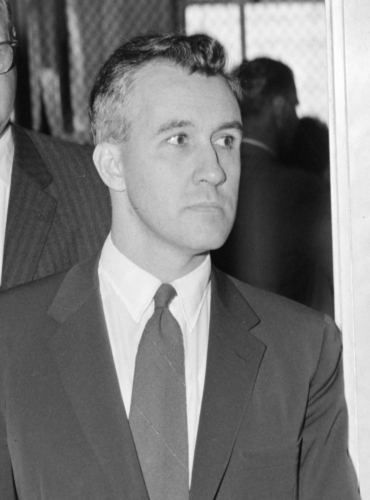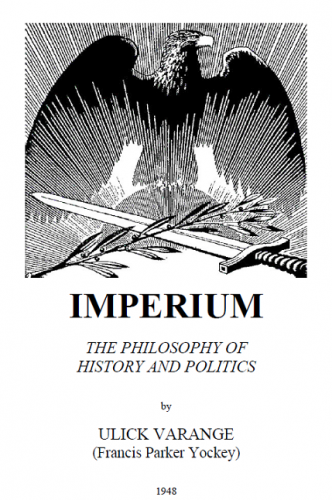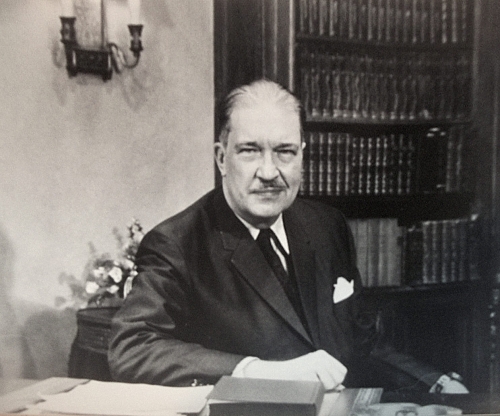The writings of Francis Parker Yockey have fascinated the far Right for a half-century and more. I would argue that the person most responsible for this popularity is the late classics professor Revilo P. Oliver. While Prof. Oliver had little practical input in the distribution of Yockey writings (that credit would go more to Willis Carto and George Dietz), it was Oliver’s imprimatur that lent Yockey a gravitas that ensured he would be cherished as something other than the author of some controversial, obscurantist tracts.
This is true even though Oliver disagreed with Yockey on a number of key points. He championed Yockey even in the early 1960s when Oliver was writing for the John Birch Society and had to couch his praise in evasive words. Years later, when his critical essays were mainly limited to the small-run periodical Liberty Bell and he could write whatever he pleased (which often meant page-long footnotes explicating minutiae of philology, archeology and race), he still held Yockey in great esteem, someone whose errors were as worthy of explication as his insights.
Accordingly, anyone who studies Yockey very quickly runs into Prof. Oliver. Here are some highlights of the Yockey-Oliver connection.
 RPO in the Yockey Biographies
RPO in the Yockey Biographies
We now have two big Yockey biographies at our disposal. There is Kevin Coogan’s Dreamer of the Day: Francis Parker Yockey and the Postwar Fascist International, published in 1999. And, new in 2018, Kerry Bolton’s Yockey: A Fascist Odyssey. Despite the somewhat similar titles, the books are very different, and hardly “synoptic” narratives. While offering many curious details of Yockey’s life, the Bolton book largely takes an historiographic view, reviewing how Yockey was seen and written about through the passing decades. For example, Bolton tells us that one notable American figure of the Right, Wilmot Robertson of The Dispossessed Majority and the magazine Instauration, did not care for Yockey at all. Yockey was too Spenglerian; he followed Spengler’s rather mystical and unprovable idea of historical cycles. Worst of all, he tried to evade the hard and essential factor of biological (or “vertical”) race. Yockey, like Spengler, instead emphasized what he called “horizontal race,” a kinship more of cultural spirit than blood.
As for Oliver, he shared some of these objections, but never ceased to endorse what he saw as the kernel of Yockey’s argument, which was the quasi-organic unity of (Western) culture. He knew of Yockey before Yockey’s Imperium was popularized in the early 1960s. He praised Yockey’s insights in the pages of American Opinion and The American Mercury during that decade. He assisted with the founding of the Yockeyite National Youth Alliance organization in the late 60s. He was still treating Yockey as a figure of serious analysis in the 1980s.
Conversely, in the Coogan study Oliver hardly appears at all. He is merely a name mentioned in passing, mainly with regard to the National Youth Alliance. Coogan ignores RPO’s extensive writing on Yockey. For that matter, Coogan does not seem to be much interested in Imperium—or even have read it, let alone Yockey’s other writings. For Coogan, Yockey’s “philosophy of history” exists mainly as a title of a big cult book that enraptured the far Right in the 1960s and beyond. It is most peculiar to attempt a biography of a philosopher without discussing his philosophy, let alone critics’ commentaries on it, but that is what we have here. And it explains why Coogan makes RPO no more than a minor, ancillary figure.
To digress a little: only about half of Coogan’s Dreamer of the Day pertains to Yockey’s writing or life events. There is little historiography or critical discussion, from RPO or anyone else. And yet the book is far longer than it needs to be (644 pp. in paperback), padded out with every stray rumor and scrap of research the author found. The biographical portion is derived in large part from FOIA files as well as various letters that an earlier researcher, Keith Stimely, received in the 1980s. The rest of the content is a hyperbolic exposition of what Coogan calls the “Fascist International”: a murky stew into which he stirs such extraneous, oddball characters as Chilean diplomat and mystic Miguel Serrano, and British occultist Aleister Crowley. Throughout the book Coogan throws in misinformed, lurid notions about such things as Yockey’s parentage (Coogan has the birthdate of Yockey’s father Louis wrong, and thereby implies Louis was a bastard, born years after his ostensible father died) and researcher Stimely’s personal life (based on allegations in David McCalden’s lively-but-scurrilous Revisionist Newsletter in the 1980s). Sensationalism was the main objective here.
RPO on Comparative Morphology
Much of Oliver’s writing on Yockey is a half-century old now, yet it is still the most trenchant and inclusive analysis. So far as I can tell, he is the only person who analyzed Imperium as a work in a definable genre, what one might call the philosophy of morphological history. In a very long 1963 essay, published in American Opinion (though very un-Birchite in scope and theme), he compares Yockey with a number of others in the school including, most obviously, The Decline of the West‘s Oswald Spengler, Lawrence R. Brown (The Might of the West) and Arnold Toynbee (A Philosophy of History).
Although RPO quibbles with some of Yockey’s factual asides—e.g., his apparent forgetfulness about the Thirty Years War when stating that Germany was fortunate to avoid most of the carnage that depleted the rest of Europe from the Middle Ages onward—he is generally appreciative of and laudatory toward Imperium. The basic reason for this seems to be that, whatever Oliver’s own doubts may have been about Spenglerian theories of historical morphology, or Yockey’s own quasi-mystical belief in Destiny, he agrees with the Yockey’s fundamental argument: that the Western civilization from the Middle Ages at least has been a unitary whole, and that the destructive conflicts of the 20th century amounted to a pathology exacerbated by outside elements:
[T]he culture of the West, like every viable civilization, is a unity in the sense that its parts are organically interdependent. Although architecture, music, literature, the mimetic arts, science, economics, and religion may seem at first glance more or less unrelated, they are all constituent parts of the cultural whole, and the disease of any one will sooner or later affect all the others. Your hands will not long retain their strength, if there is gangrene in the foot or cancer in the stomach.[1]
 Writing in 1963, Oliver avoids mention of Yockey’s “culture-distorter” or the Jewish Question (although he makes a nod to that Birchite proxy, the International Communist Conspiracy). Years later, with the “Birch Business” well behind him, Oliver would be more explicit.
Writing in 1963, Oliver avoids mention of Yockey’s “culture-distorter” or the Jewish Question (although he makes a nod to that Birchite proxy, the International Communist Conspiracy). Years later, with the “Birch Business” well behind him, Oliver would be more explicit.
This brings us to “The Enemy of Our Enemies” (1981), which George Dietz’s Liberty Bellmagazine put out in a fat issue that also contained Yockey’s own “The Enemy of Europe.” The two monographs were later republished together as a paperback book.[2] Yockey’s extended essay, translated back into English from a surviving German version, is nearly a hundred pages, an excoriation of American hegemony over the European culture-soul. The Oliver section is even longer, a brilliant and cranky, no-holds-barred fulmination. While beginning as an exegesis of Yockey, his influences and his errors, this commentary readily departs from that pretext, delivering instead RPO’s own, broader variation on the general theme:
In 1914, our civilization was worm-eaten at the core, but its brightly glittering surface concealed the corruption within from superficial eyes. It was taken for granted that the globe had become one world, the world of which the Aryan nations were the undisputed masters, while all the lesser races already were, or would soon become, merely the subject inhabitants of their colonial possession. This reasonable conception of the world’s unity oddly survived the catastrophes that followed and it conditioned unthinking mentalities to accept the preposterous notion of the current propaganda for “One World,” which is couched in endless gabble that is designed to conceal the fact that it is to be a globe under the absolute and ruthless dominion of the Jews—a globe on which our race, if not exterminated, will be the most degraded and abject of all.[3]
The Introduction to Imperium: A Question of Attribution
Finally, a note on a point that perennially comes up when Yockey and Oliver are discussed. Was the long foreword to the post-1960 editions of Imperium, signed Willis A. Carto, actually written by Mr. Carto, or by Prof. Oliver? Keith Stimely claimed the latter, in a furious booklet he distributed in the mid-1980s after he left Carto’s employ at the Institute for Historical Review.
When pressed, Oliver was vague on the subject, writing Stimely in 1984 only that he had given Carto permission to use material he had written as suggested introduction to a new reprint of the book. Stimely reproduced part of Oliver’s letter in his anti-Carto booklet, and Kerry Bolton also excerpt it in his Yockey biography:
I wrote a lengthy and signed memorandum on Yockey’s importance as a philosopher of history and a nationalist, hoping to inlist the support of persons who would subsidize a new edition of Imperium . . . I . . . told Carto to make whatever use he wished of what I had written for an intoduction by him or anyone he chose to introduce the new edition. I therefore gave him the material, and it would be dishonourable of me to try to reclaim it. [4]
This essay-memorandum seems to have vanished. Oliver wrote a review of Imperium some years later (1966) for The American Mercury [5] that bears some resemblance to the philosophical discussion in the Introduction, but is otherwise entirely different: i.e., not a “retread” of some older piece that was repurposed.
When the question was put to them, both Willis Carto and his wife (now widow) Elisabeth maintained that the Introduction was indeed written by Mr. Carto himself. Therefore, worrying through the problem, Kerry Bolton comes to a Solomonic compromise, and says that it
seems plausible, stylistically and philosophically . . . that Carto wrote the first biographical half of the ‘Introduction’ and Oliver wrote the second half, commenting on the Yockeyan doctrine of Culture-pathology.
Notes
[1] Revilo P. Oliver, “History and the Historians,” 1963; collected in America’s Decline, 1983, pp. 276-277. https://archive.org/stream/AmericasDecline1983V2/OLIVERRe... [2]
[2] Yockey and Oliver, The Enemy of Europe/the Enemy of Our Enemies. Liberty Bell Publications, 2003.
[3] https://archive.org/stream/TheEnemyOfOurEnemies/EEE#page/... [3]
[4] Kerry Bolton, Yockey: A Fascist Odyssey. Arktos, 2018.





 del.icio.us
del.icio.us
 Digg
Digg
Les commentaires sont fermés.